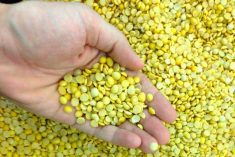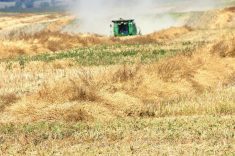Ottawa — The compromise between Canada and the U.S. to maintain the flow of goods between the two countries while limiting the trans-border flow of people during the COVID-19 crisis is a collaborative approach that serves as a global example, trade observers say.
Alan Bersin, a global fellow at the Wilson Centre, said the border closure to prevent the virus’ spread could have been much more harmful to the economy than it was.
“We saw in effect a compromise solution that recognized the importance of keeping the supply chain open, given the integrated continental production platforms that we built up between Canada and the United States, and among Canada and the United States and Mexico,” he said.
Read Also

Chinese importer buys Canadian canola after Carney visit
A Chinese importer bought a cargo of Canadian canola shortly after Canadian Prime Minister Mark Carney’s visit to Beijing last week, trader sources said.
Prime Minister Justin Trudeau quietly rebuffed overtures from U.S. President Donald Trump to lift the border restrictions in mid-April, saying it will be many weeks before that can happen.
At a recent digital press conference hosted by the Wilson Centre, experts spoke about the co-operative nature seen on the border since COVID-19 forced the closure.
Panelists said that people have been co-operating with the border closure, as traffic between the borders for anything other than commercial or trade purposes has virtually stopped.
“For the first time I think we can say that instead of being an area of conflict and of dissension and division, the border may have pointed the way to the kind of co-operation, the kind of balanced approach, that may well be an example for our countries to employ even beyond the border region,” said Bersin.
Laurie Trautman, a global fellow with the Wilson Centre based in Washington, said the lack of cross-border travel has shifted demand and led to some changes within the supply chain, but was generally optimistic about the situation.
“I hope that this kind of situation, particularly for those that are operating on a border area, draws people’s attention to the importance of our relationship with Canada and the importance of that border and the importance of communication and having those strengthened relationships.”
While some pundits and politicians have suggested the border restrictions need to be lifted, Canada and the U.S. are expected to agree on extending them by another 30 days.
Despite U.S. President Donald Trump’s release of a three-stage plan to open the country’s economy, Trudeau has been clear Canada will make its own decisions.
“We do not feel that re-opening the border any time soon is likely. My responsibility is to ensure the protection and safety of Canadians, that is what we will continue to do, and the conversation with the Americans has been extremely aligned and extremely productive,” Trudeau said this week.
The initial closure took effect on March 21 and is in effect for 30 days.
Canada’s Agriculture Minister Marie-Claude Bibeau spoke with her U.S. counterpart, Sonny Perdue, by phone. According to Bibeau’s office, the two spoke about how collaboration and uninterrupted trade are critical in supporting farmers and food businesses in ensuring food security for both nations.
“The two leaders emphasized the importance of agricultural trade for food security, and the continued collaboration between our two countries to facilitate our integrated supply chain and to safeguard the health of our industries and our citizens,” a press release from Agriculture and Agri-Food Canada said.
— D.C. Fraser reports for Glacier FarmMedia from Ottawa.
















